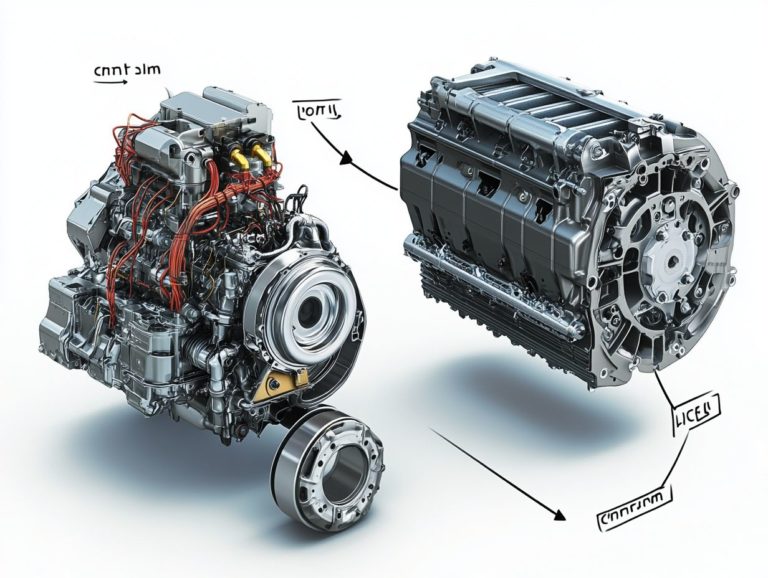Comparing Eco-Friendly Features in New Cars
As the world becomes increasingly aware of environmental concerns, your interest in eco-friendly cars is likely growing. But what truly defines a car as eco-friendly? This article delves into the various features that enhance a vehicle’s sustainability, from electric and hybrid engines to impressive fuel efficiency and innovative materials.
You ll discover the environmental advantages and potential cost savings that come with owning an eco-friendly car. This guide helps you select the perfect model that aligns with your lifestyle. Dive into the exciting world of eco-friendly driving today!
Contents
- Key Takeaways:
- Types of Eco-Friendly Features in Cars
- Benefits of Owning an Eco-Friendly Car
- How to Choose the Right Eco-Friendly Car
- Frequently Asked Questions
- What are some key eco-friendly features to look for when comparing new cars?
- How do hybrid and electric engines differ in terms of eco-friendliness?
- What does it mean for a car to have a high fuel efficiency rating?
- Are all new cars required to meet certain emission standards?
- How can I determine if the materials used in a new car are eco-friendly?
- Are there any eco-friendly features that can also save me money?
Key Takeaways:
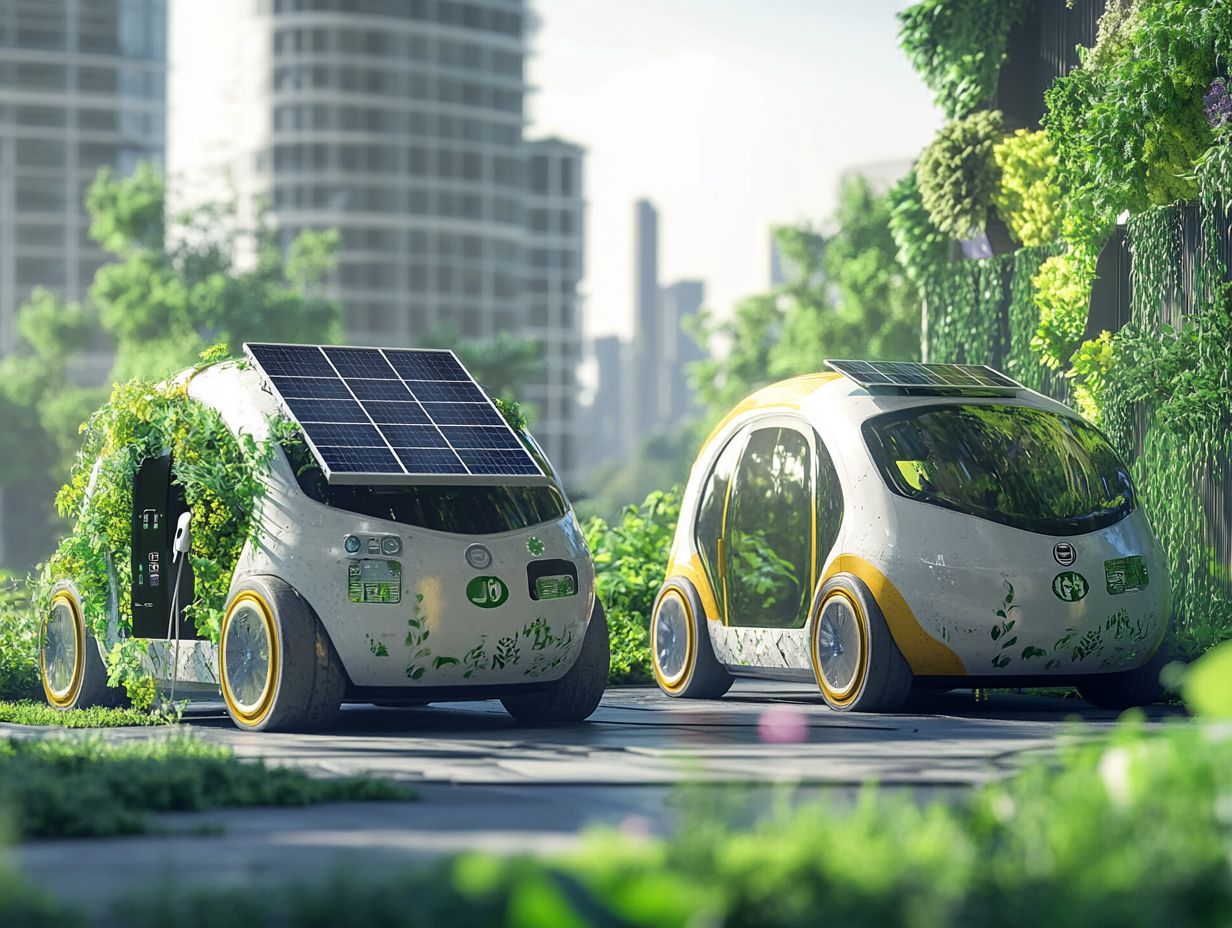
- Eco-friendly cars can have electric or hybrid engines, fuel efficiency, and sustainable materials, making them better for the environment and reducing emissions.
- Owning an eco-friendly car can bring benefits like reducing your environmental impact, saving money on fuel costs, and potentially qualifying for government incentives.
- When choosing an eco-friendly car, consider factors like your budget, driving habits, and the availability of popular models. Read reviews to find the best fit for your needs.
What Makes a Car Eco-Friendly?
An eco-friendly car is designed to reduce its environmental impact, focusing on lowering greenhouse gas emissions and enhancing fuel economy. This includes vehicles that use electric motors, cars that use both gas and electric power, or alternative fuels, all contributing to sustainable transportation practices.
By choosing eco-friendly vehicles, you can significantly lower your carbon footprint while promoting environmentally conscious driving habits. Key features of these vehicles include emissions sensors that monitor harmful pollutants, optimizing engine performance and cutting down on toxins released into the atmosphere.
For instance, a battery electric car operates solely on electricity, providing zero tailpipe emissions. In contrast, hybrid electric cars transition seamlessly between gas and electric power to maximize efficiency.
Compressed natural gas vehicles use natural gas instead of gasoline, producing fewer emissions than traditional gasoline cars. Embracing eco-friendly driving habits, such as smooth acceleration and maintaining a consistent speed, enhances overall efficiency and maximizes the environmental benefits of these innovative vehicles.
Types of Eco-Friendly Features in Cars
Cars today come equipped with an array of eco-friendly features designed to help improve energy efficiency and minimize environmental impact. To make informed choices, consider the key features to compare in cars, which include innovations ranging from advanced electric and hybrid engines to the use of sustainable materials in vehicle design—all playing a crucial role in fostering a greener transportation sector.
By embracing these eco-conscious practices, manufacturers are not merely responding to consumer demand; they are actively championing a substantial shift toward more sustainable driving habits.
Electric and Hybrid Engines
Electric and hybrid engines are at the forefront of eco-friendly technology in the automotive industry, significantly reducing CO2 emissions and enhancing fuel economy. Electric vehicles (EVs) rely on electric motors and rechargeable batteries, while hybrid electric vehicles cleverly combine gasoline engines with electric propulsion systems for better efficiency.
The rising popularity of plug-in hybrids and fuel cell vehicles signals a shift toward more sustainable transportation solutions. These advanced systems not only promise lower emissions but also provide a smoother driving experience, which has become a significant draw for many consumers.
The mechanics behind these engines enable energy to be recaptured during braking, feeding it back into the system to maximize efficiency. By integrating these innovative technologies, you can enjoy seamless acceleration and deceleration, making your journey both relaxing and eco-friendly.
Moreover, the inherent design of hybrid and electric engines enhances overall vehicle performance, paving the way for a greener future in automotive travel.
Fuel Efficiency and Emissions
Fuel efficiency is crucial for eco-friendly vehicles. It greatly impacts your fuel consumption and emissions levels.
With the latest advancements in emissions sensors and technologies, manufacturers are fine-tuning gasoline engines to ensure they meet stringent environmental standards while still delivering impressive performance.
By embracing smart driving habits, you can further elevate fuel economy and diminish your overall environmental footprint.
Innovations like hybrid systems, regenerative braking (a system that recovers energy when you brake), and lightweight materials are transforming vehicles into increasingly efficient machines. This strikes an exceptional balance between performance and sustainability. You can make a real difference today by adopting simple habits, such as:
- Maintaining steady speeds
- Regularly servicing your vehicle
- Steering clear of unnecessary idling
Even minor adjustments, like minimizing cargo weight and keeping your tires properly inflated, can lead to better mileage and reduced emissions. When combined, these efforts enhance the eco-friendliness of each journey and contribute to a cleaner, greener future for everyone on the road.
Sustainable Materials and Design
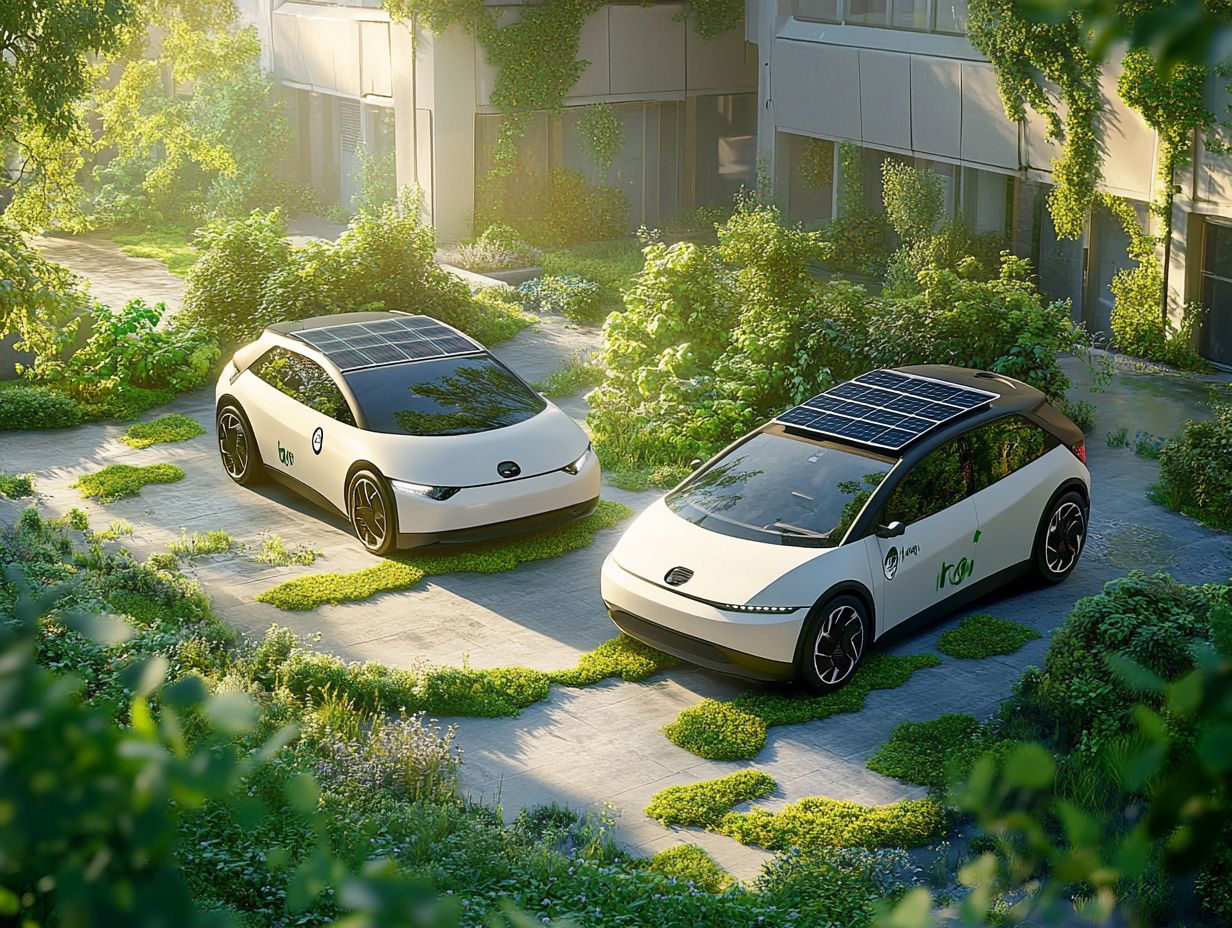
Sustainable materials and design are crucial in crafting eco-friendly vehicles. They showcase a strong commitment to environmental protection and the principles of green philosophy.
By opting for materials that are recyclable or sourced from renewable origins, you can significantly reduce a vehicle’s environmental footprint without compromising on performance or aesthetics.
Paying close attention to vehicle weight further enhances fuel efficiency, making these cars genuinely eco-friendly for everyday use. This integration of sustainable practices benefits the planet and offers distinct advantages in vehicle longevity and maintenance.
For example, innovative design strategies, such as using biodegradable composites and recycled metals, bolster a car’s overall durability while minimizing waste during production. Brands using eco-friendly methods often see lower maintenance costs, as sustainable materials typically exhibit greater resistance to wear and degradation.
The shift toward electrification is seamlessly supported by sustainable components. Vehicles increasingly align with energy-efficient technologies, clearly reflecting a trend that resonates throughout the automotive industry.
Benefits of Owning an Eco-Friendly Car
Owning an eco-friendly car presents you with numerous advantages, from markedly reducing your environmental footprint to realizing potential cost savings.
By choosing to drive eco-friendly vehicles, you actively participate in lowering greenhouse gas emissions and fostering a healthier planet. You can also enjoy financial benefits through reduced fuel expenses and various government incentives.
These incentives enhance the accessibility of eco-friendly cars and underscore the critical role of sustainable transportation options in today s economy.
Environmental Impact
The environmental impact of eco-friendly vehicles is truly significant. They greatly reduce CO2 emissions when compared to traditional gasoline-powered cars.
By embracing sustainable practices and cutting-edge technologies, these vehicles play a vital role in the fight against climate change and the promotion of cleaner air.
As you become more aware of your ecological footprint, the shift towards eco-friendly vehicles becomes increasingly clear. In fact, studies reveal that electric vehicles can produce up to 60% fewer carbon emissions over their lifetimes compared to conventional vehicles, especially when powered by renewable energy sources.
This remarkable reduction addresses the urgent threat of greenhouse gases and enhances public health by reducing air pollution. A cleaner atmosphere can lead to lower rates of respiratory diseases and improve your overall quality of life.
This illustrates how eco-friendly vehicles extend their benefits beyond environmental issues, positively impacting human well-being.
Cost Savings
Cost savings are undeniably one of the most attractive aspects of owning an eco-friendly vehicle. This is especially true when you consider enhanced fuel efficiency and reduced maintenance expenses. These vehicles typically consume less fuel and require fewer repairs, thanks to their smart systems. This translates into long-term financial benefits for you.
Many insurance companies even offer lower premiums for eco-friendly cars. This adds another layer of cost efficiency to this environmentally friendly choice.
Take hybrid and electric models, for example. They can achieve remarkable mileage on a single charge or tank often outpacing traditional options by as much as 50%. Recent studies reveal that owners of eco-friendly vehicles can save an average of $500 annually on fuel expenses alone.
The durability of these vehicles often results in lower maintenance costs. Electric cars need less frequent servicing. Case studies indicate that government incentives can provide additional savings opportunities. This further solidifies the argument for choosing eco-friendly options.
Explore these factors to discover amazing ways to save money in the long run!
Government Incentives
Government incentives play a crucial role in encouraging your adoption of eco-friendly vehicles. They offer financial support through tax credits, rebates, and various benefits.
These incentives not only help ease the initial cost of purchasing eco-friendly cars but also highlight the importance of environmental protection within the transportation sector. As more governments roll out measures to promote sustainable practices, you stand to gain significantly from these initiatives.
In many areas, tax credits can reach thousands of dollars for electric and hybrid vehicles. This makes them far more attainable for you as an average buyer. Local governments often provide additional rebates that complement federal incentives, creating a multi-layered approach to financial support.
The variation in these incentives tends to sway consumer choices. Buyers in regions with substantial rebates are more inclined to consider eco-friendly options.
As awareness of environmental issues continues to rise, you may find yourself drawn to vehicles that reflect your values. This drives up the demand for sustainable transportation solutions.
How to Choose the Right Eco-Friendly Car
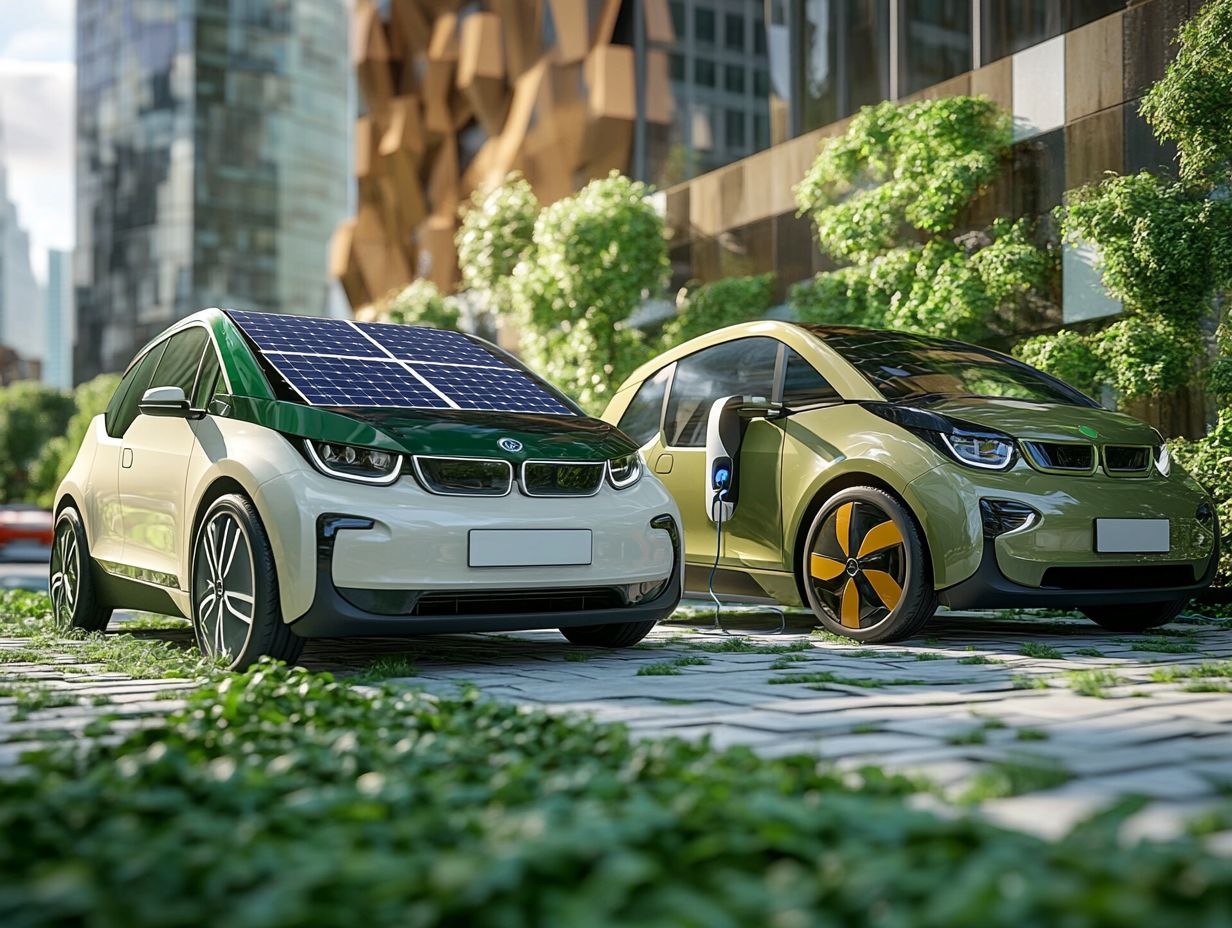
Selecting the perfect eco-friendly car requires a keen understanding of several key factors, such as vehicle ratings, eco-friendly features, and your unique driving needs. For a deeper insight, consider comparing performance features in electric cars.
With a growing array of eco-conscious vehicles on the market, it’s essential for you to assess your priorities, whether it’s fuel economy, emissions, or the kind of driving experience you seek. For guidance, check out the top rated cars for environmental conscious users.
By conducting thorough research on your options, you can make informed choices that resonate with your eco-friendly aspirations.
Start your eco-friendly journey today by visiting your local dealership!
Factors to Consider
When selecting an eco-friendly car, you must consider several factors. Look at vehicle efficiency, fuel economy, and your unique driving habits, and be sure to check out user reviews of the best eco-friendly cars for additional insights.
Understanding how these elements influence overall performance and emissions will help you find the most suitable eco-friendly vehicle for your lifestyle, especially when comparing smart parking features in new cars.
For instance, think about the type of driving you typically engage in whether it s city commuting, long highway trips, or a blend of both. This can significantly impact fuel usage.
An electric vehicle might suit you perfectly if you have short daily commutes, while a hybrid could be a better fit for longer journeys.
Additionally, examining the vehicle’s emissions ratings and the environmental impact of its materials will offer valuable insight into its sustainability, especially when considering the top eco-friendly new cars of 2024.
Test-driving different models and researching real-world fuel economy reports can further refine your decision. This ensures you strike the right balance between personal comfort and ecological responsibility.
Discover the Best Eco-Friendly Cars!
Several standout models grace the eco-friendly vehicle market, each tailored to meet the needs of eco-friendly buyers. The Tesla Model 3, Nissan Leaf, and Toyota Prius Prime are celebrated for their remarkable fuel economy and innovative features. They are top contenders for anyone looking for sustainable transportation solutions.
Reviews consistently highlight their performance, reliability, and environmental benefits.
Each vehicle shines in its own way. The Tesla Model 3 garners accolades for impressive acceleration and cutting-edge technology. The Nissan Leaf is praised for its affordability and practicality, appealing to a diverse audience. The Toyota Prius Prime, with its plug-in hybrid capabilities, strikes a perfect balance between electric and gasoline power, making it ideal for reducing your carbon footprint without compromising convenience.
When considering these options, take time to evaluate your specific needs. Think about your daily commuting distances, the availability of charging infrastructure, and any technological features that might enhance your driving experience. This thoughtful approach will help you choose the eco-friendly vehicle that best suits your lifestyle.
Frequently Asked Questions
What are some key eco-friendly features to look for when comparing new cars?
When comparing new cars, look for features like hybrid or electric engines, fuel efficiency ratings, and consider using a price comparison for eco-friendly vehicles to help you make an informed choice regarding compliance with emission standards.
How do hybrid and electric engines differ in terms of eco-friendliness?
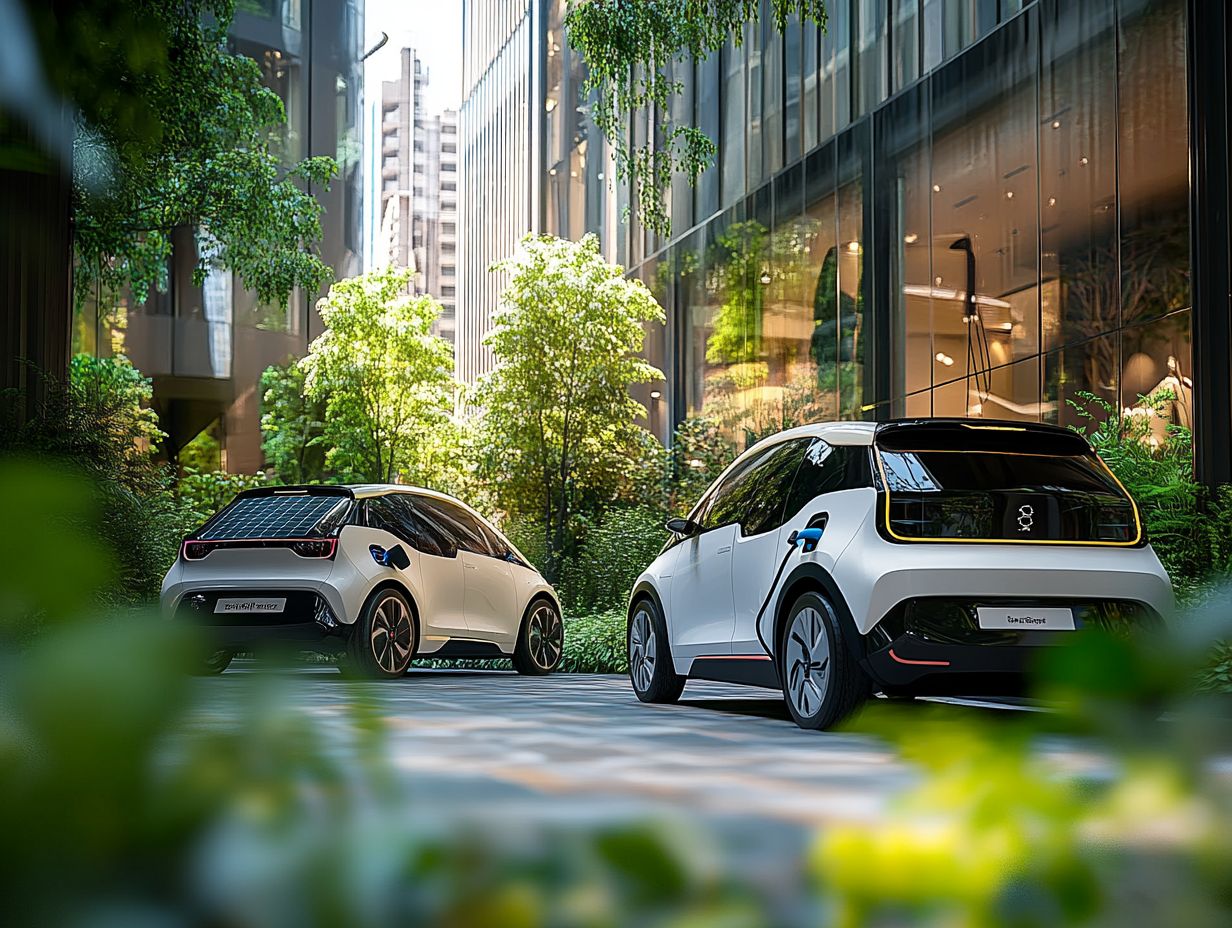
Hybrid engines use a combination of gasoline and electricity, reducing fuel consumption and emissions. Electric engines run solely on electricity, producing zero emissions.
What does it mean for a car to have a high fuel efficiency rating?
A high fuel efficiency rating means the car can travel a longer distance on less fuel, thereby reducing greenhouse gas emissions.
Are all new cars required to meet certain emission standards?
Yes, all new cars must meet government-set emission standards to reduce harmful pollutants released into the air.
How can I determine if the materials used in a new car are eco-friendly?
You can identify eco-friendly materials by looking for cars that use recycled or renewable materials, or those certified as environmentally friendly by organizations like the EPA. For more insights, check out the rise of eco-friendly luxury cars.
Are there any eco-friendly features that can also save me money?
Yes! Features such as regenerative braking and solar panels can save you money by reducing fuel or electricity consumption.
Start your journey to a greener future today!





